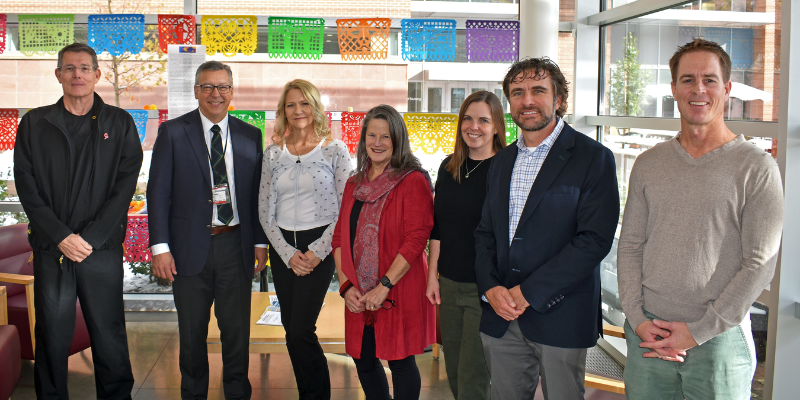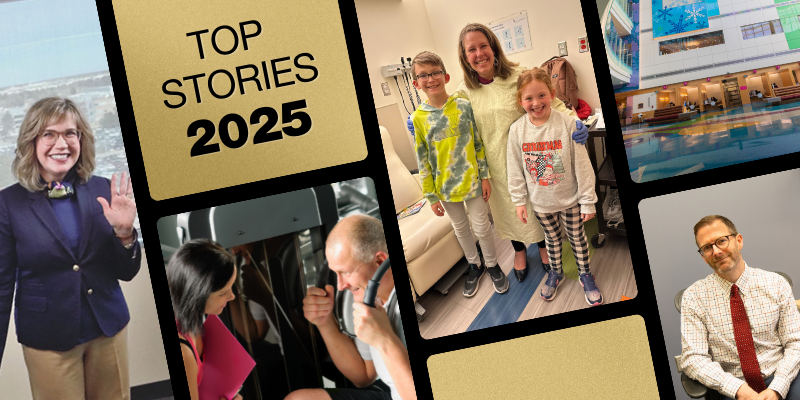Decentralized clinical trials (DCTs) have soared in popularity, fueled by COVID-19 restrictions and the rise of telehealth in recent years.
They offer potential benefits such as increased access and convenience for research participants and greater cost-efficiency over traditional clinical trials. Some or all trial activities occur outside of traditional clinical trial sites, such as in a hospital, and take place in participants' homes or their local clinic. Yet without a central study location or trained staff conducting a research visit, maintaining oversight becomes far more complex, posing unique ethical challenges.
Presenters explored these challenges at the 14th Annual CCTSI Research Ethics Conference on November 7. The conference was co-sponsored by the Center for Bioethics and Humanities and the Colorado Clinical and Translational Sciences Institute (CCTSI).
“A key goal was for researchers to realize that all research has decentralized elements that raise ethical issues,” said Matthew Decamp, MD, PhD, an associate professor in the Center for Bioethics and Humanities who organized the conference. “We can learn a lot from talking to each other and learning from the prior experiences of others who have done decentralized research.”
Keynote speaker Barbara Bierer, MD, director of the Multi-Regional Clinical Trials Center of Brigham and Women’s Hospital and faculty in the Center for Bioethics at Harvard Medical School, highlighted common challenges in DCTs. She also outlined an ethical framework to guide researchers when conducting these trials.
“There is often greater data variability,” she explained to an engaged audience in the Fulginiti Pavilion for Bioethics and Humanities. “If you are doing a procedure in a controlled environment, a lab test in your lab, or an imaging in your facility, you are doing it the same every time. When you ask people to do it locally, at home, or with a nurse, it may be quite different.”
She added that DCTs also pose a risk of bias and a greater risk to participant safety, well-being, privacy, and confidentiality.
“DCTs should be designed to be as flexible as possible and as limited as necessary to ensure participant safety and data reliability,” concluded Bierer.
After the keynote talk, Brian Foy, PhD, professor of Microbiology, Immunology and Pathology at Colorado State University, presented on challenges he encountered while conducting a DCT to mass administer the anti-parasitic drug, Ivermectin, in African villages to treat malaria.
“The consent process is multi-layered,” he said, explaining that the consent process had to be reviewed not only by the country and ethical review committees but also by regional health authorities, village elders, and chiefs before being conducted with heads of households, and, finally, with the individuals participating in the trial.
“This is a difficult site to work in; most older people are illiterate and often don’t have words in their local language that are used in the consent forms. Instead, it is the community health workers describing the study to them,” he added.
Having a placebo group for such an effective treatment also posed an unforeseen challenge. “The first time we did this, the community health workers that got put in the placebo group were very angry. They wanted to take the drug because they’ve known this drug for so long,” said Foy.
During the course of the conference, Angela Bryan, PhD, presented Research on Cannabis Using Mobile Laboratories; Bethany Kwan, PhD, presented The Pragmatic EHR-Embedded Trials Program (PEET): Identifying and Managing Ethical Issues; and Ricardo Gonzalez Fisher, MD, presented Of Trust and Consequences: Community Perspectives on Decentralized Research.
Although decentralized clinical trials may pose greater ethical challenges, it is important to recognize their potential benefits.
DeCamp said, “I think one of the biggest advantages is the potential for diverse and inclusive enrollment. But I still say “potential.” That's because we still don't know enough about how participants think about decentralized elements of research.”
Bierer emphasized the need for academic institutions to provide investigators with the proper tools to conduct and oversee DCTs before we can assess their potential benefits. “It is an institutional responsibility to do a better job of supporting our investigators and their research teams. I want to see the systems catch up with the needs before we evaluate whether it is successful or not,” she said.


.png)

-1.png)
